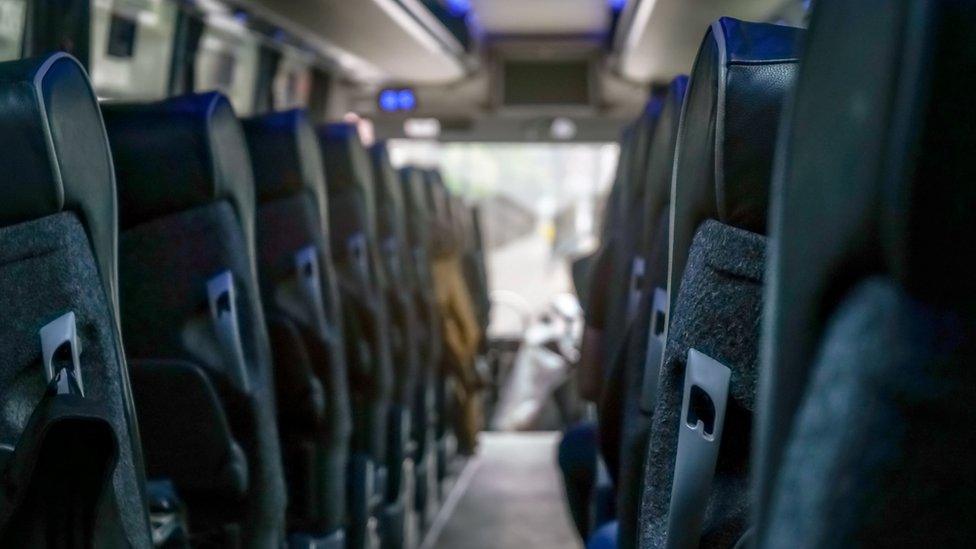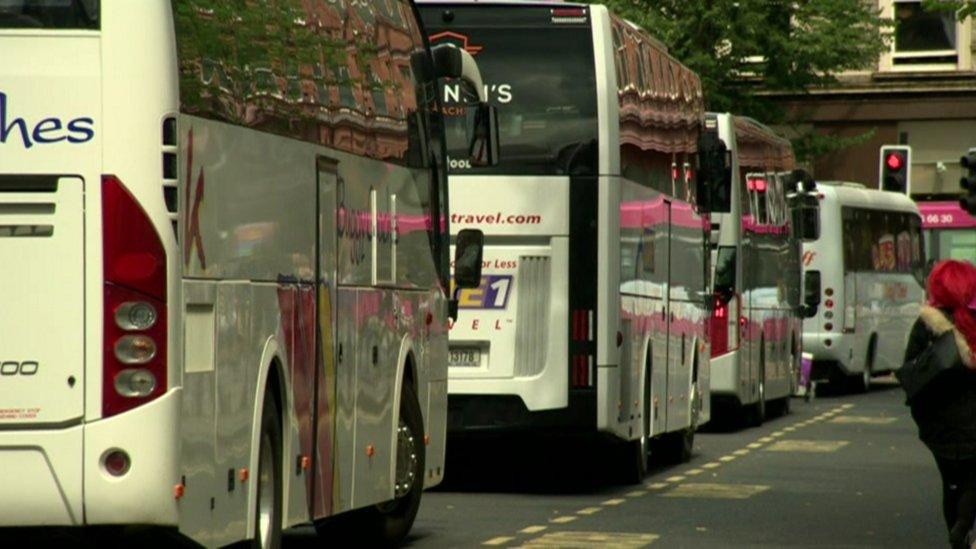Coronavirus: Private coach industry 'decimated by Covid-19'
- Published

Many bus companies cannot run services due to a lack of tourists
An industry body representing Northern Ireland's private bus and coach sector has said it is at its most vulnerable.
Bus and Coach NI said operators are at risk of collapse.
Companies have not been able to run services due to a lack of tourists. Some businesses have received grants from Stormont.
Karen Magill, chief executive of Bus and Coach NI, told BBC Radio Ulster's Inside Business programme the future for some operators is uncertain.
"Our industry has been decimated by Covid-19 and at this point in time while other sectors of the economy are recovering, unfortunately we are not.
"We still have 75% of our fleet idle and we wont see any return to business until March or April next year," she said.
"Despite not being back to full capacity, with little or no income, and restricted demand, we have increased additional costs incurring every day.
"We have significant Coronavirus Business Interruption Loan Scheme (CBILS) loans and those increasing Covid debts and restricted demand mean companies are seriously vulnerable.
"If you have a loan of £1.5m, your monthly repayment now is £16,000, and this is based on actual figures from some companies," she said.
Asked if she expects all operators to survive the next few months, Ms Magill said: "At this point in time, no I don't."
Coach operators rely heavily on international visitors who book excursions to well-known tourist areas.
The pandemic has seen a drastic reduction in the amount of visitors arriving on our shores.
'Earning nothing'
For Sean Logan, who owns Logan Executive Travel in Dunloy, County Antrim that means his fleet is parked up.
"We would normally have 50 touring vehicles and at this time of year we would expect our yard to be empty. At the minute we are lucky to get two vehicles on tour a week.
"There is some school work but it's not what we need, with the value of the fleet we have and the debt we have incurred to survive so far.
"My house overlooks my yard and the first thing I see when I pull the curtains back in the morning is a coach park. That's basically what we are.
"They cost me money while they are sitting parked, earning nothing," he told Inside Business.

More than 90 companies have been provided with grants totalling £5.7m
The government's furlough scheme ended on 30 September.
Mr Logan had to lay off some office staff as there was not enough work.
"The staff we have taken back off furlough are on reduced time, working two or three-day weeks.
"I cannot guarantee categorically that we will survive [the winter]. We have survived this far and we will do everything we can. It has taken over 40 years of my life and we will do the best we can. It's an impossible situation," he said.
Not simple
Ms Magill said additional financial support would help the industry.
"We have had two previous schemes through the Department for Infrastructure… at this stage 50% of businesses out there were not eligible for support. There was a formula which should have made life simple but didn't.
"We had one operator who received £3,200. Out of that, which is what they were eligible for, they had to pay £1,500 out to their accountant as we had to have all figures backed by an accountancy firm.
"Other operators have benefited from the scheme," she said.
The Department for Infrastructure said more than 90 companies have been provided with grants totalling £5.7m through two schemes.
"Minister Mallon is committed to doing all she can where she has the powers within her department and working with executive colleagues to support the industry through recovery."
- Published24 February 2021

- Published27 January 2021
